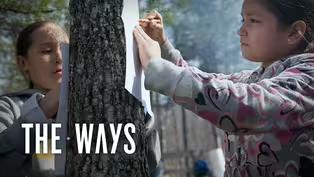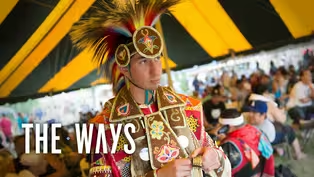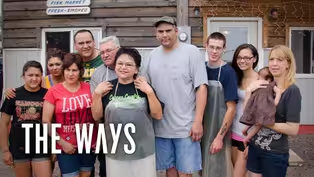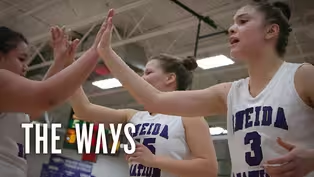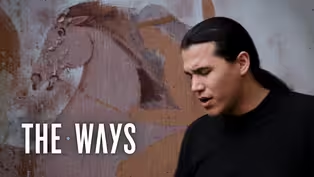The Ways
Living Language
Special | 5m 8sVideo has Closed Captions
Ron Corn Jr. hopes his daughter will be a first-language Menominee speaker.
Ron Corn Jr.’s devotion to saving the Menominee language is so strong that he made the difficult decision to quit his full-time job to spend more time raising his youngest daughter, Mimikwaeh, with the language through immersion. Learn how he hopes she will be the first child in over a generation whose first language is Menominee.
Problems playing video? | Closed Captioning Feedback
Problems playing video? | Closed Captioning Feedback
The Ways is a local public television program presented by PBS Wisconsin
Educator resources with standards alignment and extension activities are available on the PBS Wisconsin Education website.
The Ways
Living Language
Special | 5m 8sVideo has Closed Captions
Ron Corn Jr.’s devotion to saving the Menominee language is so strong that he made the difficult decision to quit his full-time job to spend more time raising his youngest daughter, Mimikwaeh, with the language through immersion. Learn how he hopes she will be the first child in over a generation whose first language is Menominee.
Problems playing video? | Closed Captioning Feedback
How to Watch The Ways
The Ways is available to stream on pbs.org and the free PBS App, available on iPhone, Apple TV, Android TV, Android smartphones, Amazon Fire TV, Amazon Fire Tablet, Roku, Samsung Smart TV, and Vizio.
More from This Collection
The Ways is a collection of language and culture stories from Wisconsin Native communities. Featured in this compilation: Lady Thunderhawks, Waadookodaadiing, Living Language, Powwow Trail, Prayers in a Song and Lake Superior Whitefish.
Video has Closed Captions
Waadookodaadiing educators integrate sugaring traditions for Ojibwe language learning. (4m 47s)
Video has Closed Captions
Dylan Jennings of the Bad River Band of Lake Superior Chippewa gives insight into powwows. (4m 46s)
Video has Closed Captions
The Petersons are part of a long tradition of commercial fishing in Lake Superior. (3m 51s)
Video has Closed Captions
Jessica House of the Oneida Nation leads the high school basketball team by example. (3m 22s)
Video has Closed Captions
Tall Paul of the Leech Lake Band of Ojibwe raps about language and Native identity. (4m 2s)
Providing Support for PBS.org
Learn Moreabout PBS online sponsorship- Ron Corn: I first go around and plow my relatives out, a couple aunties and cousins.
Then I have my, I call them, brothers, you know.
That's the way we say it in our language.
Nematok, our friends, close friends.
We do things in a good mind and a good heart and a good way.
When we need that help, I guess we believe it will come to us too.
What I'm doing is ensuring that the language goes a generation beyond myself.
I'm gonna do that through my kids, you know.
- [speaking Menominee] - Ron: I'm teaching Mimikwaeh the language using natural immersion.
Natural immersion is you just talk about your day the way you would anything else, only it's being done in Menominee.
I decided to stay home and teach her the language, 'cause it's my last unique opportunity to be able to raise a First Language fluent speaker.
I think it's hard for her to want to speak because nobody else does, you know.
There's probably about eight people that speak it.
We'll call it ten.
She's got ten of 10,000.
What's that percent?
.0001, .0001%.
That's a reality check.
The language, it could die.
The idea that we're trying to preserve is a living language.
Pematesemakat, it lives.
[chanting in Menominee] ♪ Every little thing is gonna be all right ♪ ♪ For me and you ♪ ♪ Don't you worry about a thing ♪ ♪ Every little thing is gonna be all right ♪ [chanting in Menominee] [speaking Menominee] So there's words readily available for everything in nature.
The word for falling snow is paeqnan.
The word for snow on the ground is kon.
Crusted snow, wanaew, we say wanaew.
The word snowflake is even different yet than both of them, we say pewaeqsew.
[conversing in Menominee] The beautiful thing is it's not much easier in the woods because our language is really based on what's going on out there.
How do we make that transition into today's life too?
We're not always sugaring, we're not always ricing.
We spend a lot of days at home, in the office, on the road.
We've got to learn to express those things too, you know.
The language has to make that transition if it's gonna be relevant and if it's gonna survive, you know.
When I was young, my first main teacher, Waqseciwan, she was starting to get sick and forgetful, you know.
One day we were just sitting at her house, talking, and she tells me, "Now I can die," she told me.
"For 25 years," she said, "I've tried to teach someone this language.
"Now, today, I've done that."
Then she continued on in Menominee, she said, [quoting in Menominee] She told me.
She says, "You know, maybe you're gonna be an old man "and hear these kids talking our language."
She said, "I love ya.
"Don't give up."
[singing softly]
Support for PBS provided by:
The Ways is a local public television program presented by PBS Wisconsin
Educator resources with standards alignment and extension activities are available on the PBS Wisconsin Education website.
